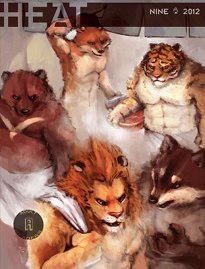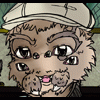'Heat 9' interview: contributors Kandrel and Scappo
 Isiah had the chance to interview most of the contributors to annual adult anthology Heat 9, published by Sofawolf; some could not be reached. Related interviews: Whyte Yote & Alastair Wildfire – Camron & Vantid – Alopex – Huskyteer – Kyell Gold & Nimrais – Tempe O'kun
Isiah had the chance to interview most of the contributors to annual adult anthology Heat 9, published by Sofawolf; some could not be reached. Related interviews: Whyte Yote & Alastair Wildfire – Camron & Vantid – Alopex – Huskyteer – Kyell Gold & Nimrais – Tempe O'kun
Isiah Jacobs: Good evening, Kandrel, Scappo. Thank you both so much for coming on to the show. I really appreciate this! Kandrel, I understand you submitted a story to this year’s volume of Heat and Scappo, you provided the illustrations. Have you two heard of each before you were brought on to do Heat?
Kandrel: Yeah, I had definitely heard of Scappo before. I tend to try to keep my eye on good artists. Mainly because I like collecting art. Usually I recognize most of the artists that are up and coming by name, if not by their style.
Scappo: Well, I’m glad you like my art! Heh. I had never heard of Kandrel before, but that’s usually because I’ve got my head buried in commissions. So I don’t really have a whole lot of time to read. But I did read and enjoy “Better”. I think it’s one of the better stories that I’ve read.
Isiah Jacobs: With your illustrations for “Better” did Sofawolf come to you, or did you go to them?
Scappo: I was talking to Tempe O’kun about potentially working with him on the next volume of Heat, and I offered any help for the current issue. He said I should go talk to Alopex. So when I asked him, he said, “Oh, you’re just in time! We need someone to illustrate this story by Kandrel.” And I said okay, send me a copy, and I’ll see what I come up with. It just went from there.
Isiah Jacobs: And you yourself chose which parts of the story to illustrate?
Scappo: He gave me the story and said to pick out the parts that are most iconic.
Kandrel: That’s actually a little interesting. There’s actually a story to that from my side as well. This is something that had happened during the editing phase. I got a couple of edits back from Alopex that said he had received the illustrations, and there’s a small discrepancy. In my story, I had originally described the scene where Lyss had opened the door and she sees and soldier. At one point, I describe the helmet that he’s wearing. But in the art, he was wearing a hat instead. So he asked to go back to the story and change the helmet into a hat. And there were two other instances to that same effect because it just fit a lot better.
Isiah Jacobs: One thing I found very interesting is that Kandrel, you are a gay man, but this story is straight. Why is that?
Kandrel: This is actually nothing really out of the ordinary for me. A good amount of my stories are not involved with the same basic sexuality that I have. It’s sort of my opinion that the “hotness” of a story – the thing that arouses the reader – is all in the head of the characters, rather than the head of me, the writer. So if I make it hot to the characters, it’s going to be hot to the readers.
Scappo: If I may interject here. When you’re a professional, it doesn’t matter whether or not you’re gay or bi or straight, you can write or illustrate whatever you want, and still have it be good, because you’re that professional. I am a straight man, but I have done gay art in the past. Does that mean that I’m gay? No. It means that I can appreciate gay art. Am I physically attracted to it? Maybe on some level, but not enough to really go and do something. So I would take the energy and put that into my art. Same goes for writing. Kandrel may not be interested in a relationship with a woman, but he can still write about a woman.
Kandrel: Beyond that, there is the challenge of it. When I do writing, especially when I do things for submission rather than a quick post online to keep people happy, what I like to do is challenge myself. I don’t like writing things that are formulaic. I don’t things that are skating along; cruising. I’d much prefer to take on something that stretches what I’m used to. I much prefer to write something from the point of view of a character who is female, like in this story. Someone who is very foreign. Someone who lives in a culture and society that is very different from my own. I find that it’s a lot more engaging to me if I’m writing something that’s challenging me to think differently while I’m doing it.
Isiah Jacobs: One of the big themes of the story is how certain situations can be better and how other situations can be good. Your story revolves heavily around this theme. What was your inspiration for doing this?
Kandrel: Have you ever seen the play Fiddler on the Roof?
Isiah Jacobs: I have not.
Kandrel: I’m not going to say I was influenced, but I can definitely draw a corollary. In the story, it is an impoverished neighborhood. The people living there know they’re living in squalor. They don’t live that way willfully, it’s just the card they've been dealt in life. A lot of the people living in that situation make the best of it. They accept it and move on with their lives.
They know things aren't good. They don’t have the good life, but they know when things have been better. They have that sort of internal scale of what it would take for something to be good vs. what they’re used to. When times were better than they are. I wanted to get across that acceptance of that impoverished neighborhood. The sort of disadvantaged culture and society that surrounds Lyss.
Isiah Jacobs: To talk about this culture; at one point, Lyss takes on this gender role in which she feels obligated to prepare a meal for Charles because she is a woman and that is her job. Does this also play into that culture theme?
Kandrel: Not quite. Actually, the inspiration for this story were the Iraq and Afghanistan wars. From it’s very beginning, it was meant to be a direct analogy for some of the modern war zones that even some of my readers would have personally experienced. I wanted to take that, but remove the real world significance of it. I didn’t actually want it to be the war in Afghanistan or the war in Iraq made up of furry characters. I didn’t want to do that, but I wanted to make it similar enough so that someone who was familiar with it or someone who was looking at it from the outside could start to feel that alien culture that was similar, but in so many ways just tangibly different.
I’m not sure whether you’re aware, but the UK has a very large population of Muslims and people of Middle East descent. I’ve noticed that there are these gender roles. I was trying to sort of portray that without the religious or cultural implications.
Isiah Jacobs: What I really like about this story is how you manage to mix this war type story in with a very modern concern about online dating, and how they are sometimes not as expected in real life as they are through texting.
Kandrel: You call that modern, but it’s not really. The whole concept is of mistaken identity. Or the mysterious stranger, which is a trope that has existed in writing for years. It’s not something new. It’s simply a new way for that old trope to be exploited. The fact Charles isn’t what Lyss expected him to be is more a construct of him in her head rather than anything he said.
Isiah Jacobs: Well thank you both so much for joining me! I look forward to having you back on the show in the future!

About the author
Isiah Jacobs — read stories — contact (login required)a furry journalist and Spider from Michigan, interested in science fiction
Comments
Post new comment